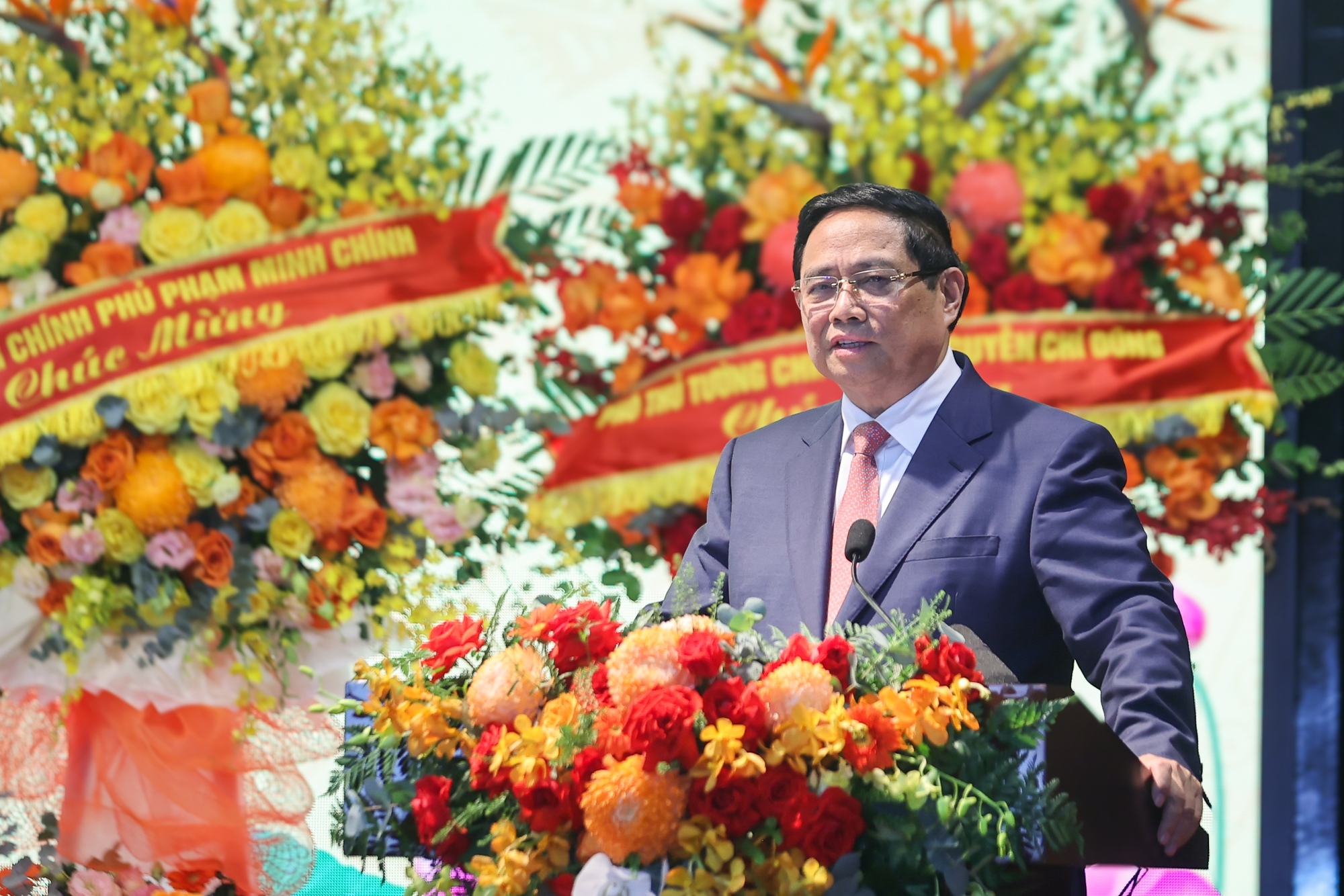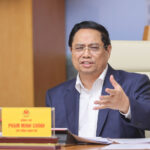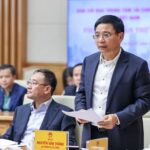On the afternoon of August 16, Prime Minister Pham Minh Chinh attended the first Party Congress of the Ministry of Science and Technology (MoST) for the term 2025–2030.

Prime Minister Pham Minh Chinh at the 1st Party Congress of the Ministry of Science and Technology for the term 2025-2030 – Photo: VGP
|
Aiming for a 30% contribution of the digital economy to GDP and 100 innovation hubs by 2030
According to the Congress report, since March 1, 2025, the Party Committee of the MoST has been established by merging the Party Committee of the MoST with the Party Committee of the Ministry of Information and Communications. This unified political core leads the fields of science, technology, innovation, and digital transformation.
The Congress sets a target that by the end of the term in 2030, the fields of science, technology, innovation, and digital transformation will contribute 5% to GDP, with the digital economy accounting for 30% of GDP. Additionally, they aim to ensure nationwide 5G coverage and pilot 6G technology, complete the digital infrastructure, and establish at least 100 innovation hubs, including at least six regional-level hubs and one national supercomputing center.
The Party Committee aims to operationalize technology and startup exchanges, commercialize at least 40% of scientific research results, and support a minimum of 1,000 technology enterprises and 3,000 technology startups.
In terms of human resources, the ministry aims to train 50,000 engineers in strategic technology fields, nuclear energy, and standardization. They also plan to attract 500 international experts and overseas Vietnamese intellectuals to work long-term in Vietnam and aim to master at least 70% of strategic technologies by the end of the term.
Innovation is inevitable, and the MoST must be a pioneer
Speaking at the Congress, the Prime Minister commended the achievements of the MoST’s Party Committee in the previous term while pointing out existing shortcomings. These include a significant gap in national scientific and technological capacity compared to developed countries, slow and inadequate breakthroughs in the implementation of policies, and a lack of high-quality human resources, including chief engineers in strategic technologies. He also mentioned the challenges in data protection and cyber security.
The Prime Minister emphasized that in the context of the recent issuance of important resolutions by the Politburo, such as Resolution 57 on the development of science, technology, innovation, and digital transformation, Resolution 59 on integration, Resolution 66 on law building and enforcement innovation, and Resolution 68 on private economic development, the MoST must take the lead in institutionalizing and implementing these resolutions. He called for the removal of institutional bottlenecks, ensuring equal access to resources, and encouraging innovation across society.
To achieve the centenary goals for 2030 and 2045, the Prime Minister affirmed the necessity of accurately identifying the tasks at hand: developing science, technology, innovation, and digital transformation rapidly, with science and technology as the foundation, innovation as the driving force, digital transformation as the method, and people as the center.
The Prime Minister also commended the MoST’s special role in state management regarding scientific research, high technology, intellectual property, standardization, measurement, and quality, as well as information technology application. He emphasized that the ministry must be a pioneer and set an example, contributing to new growth drivers and improved labor productivity.
For the next term, the Prime Minister suggested that the Party Committee of the MoST focus on key tasks: building a strong and disciplined Party Committee with high-quality members, continuing to innovate leadership thinking by considering data as the foundation, technology as a tool, innovation as the driving force, and digital transformation as the method.
He also instructed the ministry to expedite the completion of draft laws on science and technology for submission to the National Assembly, promote the national innovation ecosystem, develop digital infrastructure and data platforms, ensure cyber security, foster high-quality human resources, and encourage technology startups.
Additionally, the ministry should prioritize mastering core and strategic technologies, reorganizing research institutes towards a lean and efficient structure, developing strong research centers, and establishing shared laboratories. They should also work on finalizing the mechanisms for establishing a venture capital fund to support the transfer of research results into practice.
The Prime Minister expects each official in the science and technology sector to be a pioneer in innovation, daring to take the lead and sacrifice personal interests for the common goal. He encouraged the Party Committee to carry forward the tradition of “Unity – Discipline – Breakthrough – Creativity – Development” after the Congress. Following the Congress, the Party Committee should promptly turn the resolutions into action programs with clear tasks and responsibilities, following the principle of “six clears” for easy monitoring, inspection, promotion, and timely encouragement of effective models.
– 05:28 17/08/2025
Danang Seeks Thaco Investment for a Billion-Dollar Metro Project: A 100km Super-Line to Connect with Hoi An in Just 20 Minutes
“The vibrant city of Da Nang seeks investment from the renowned THACO, owned by billionaire Tran Ba Duong, for an ambitious urban railway project. This proposed venture aims to forge a strategic connection between the enchanting town of Hoi An and the thriving Chu Lai area. With THACO’s involvement, this project has the potential to revolutionize transportation and connectivity in the region.”
Prime Minister Approves Raising Income Threshold for Social Housing Eligibility
“The Prime Minister has given a nod to a range of proposals, including one from the Ministry of Construction, which suggests raising the income threshold for social housing eligibility. This proposal aims to make social housing more accessible to those in need.”
“Financial Institutions Embrace the Digital Asset Revolution”
The legalization of digital assets marks a pivotal moment in Vietnam’s legal history. While the regulatory framework is still a work in progress, the investment appetite from financial institutions is palpable, with many proactively laying the groundwork to enter the fray when the proverbial green light shines.




















